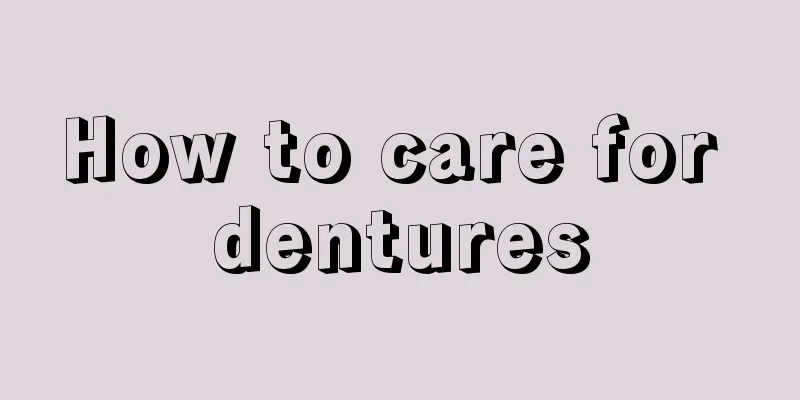How to care for dentures

|
It is said that toothache is not a disease but it can be fatal. It can be seen that dental problems can bring us a lot of inconvenience. However, in life, there are many people who need to install dentures after tooth extraction or tooth loss. Many people always think that dentures have no vitality and do not need maintenance. In fact, this often causes oral inflammation and bad breath, which is particularly detrimental to health. Therefore, the maintenance of dentures also requires good methods. Let’s learn about how to care for dentures. How to care for dentures 1. Dirty If dentures are not cleaned thoroughly, it will cause a lot of trouble: bad breath, affect the taste of food, loss of appetite, decreased gastrointestinal function, and may also cause ulcers or other diseases due to bacterial growth, and even cause tooth decay. Therefore, the elderly must develop the habit of cleaning their dentures correctly and wash them with water after each meal to remove the residue on them to avoid the growth of bacteria. Many people like to use ordinary toothpaste to brush their dentures. The abrasives in the toothbrush bristles and toothpaste will scratch the surface of the resin dentures, making it more susceptible to bacterial growth. The correct way should be to soak the dentures in a low concentration of baking soda solution for disinfection every week. The weak alkaline solution can inhibit the growth of fungi on the surface of the dentures. You can also use the denture cleaning effervescent tablets sold on the market and soak them for 5 minutes. 2. Dry This is the most easily overlooked by the elderly. After taking off their dentures, many elderly people just put them on the table or wrap them up in paper and put them away. This is not only unhygienic, but also easily causes "injury" to the dentures. Due to the limitations of their materials, dentures will crack and deform if left in a dry environment for a long time. Even a slight deformation may make them uncomfortable to wear and irritate the oral mucosa. After removing dentures, be sure to clean them promptly and soak them in clean water, preferably cooled boiled water, to prevent the dentures from deforming. Never soak dentures in salt water, vinegar or alcohol. Most people don't know how to mix salt water, and the sterilization effect is often not achieved; vinegar may corrode dentures; and alcohol will "dissolve" dentures. When wearing it, you should also pay attention to keeping your mouth moist at all times. If your mouth feels dry, be sure to rinse your mouth and drink more water. 3. Hard Using dentures to eat hard or sticky foods can easily cause them to break or dislocate, and may even damage the gums. Therefore, eat less food such as cartilage, sugarcane, nuts, glutinous rice, and rice balls. Especially in the early stages of denture fitting, you should eat soft and mushy foods so that you can make corresponding adjustments based on the initial wearing situation during the follow-up visit. Don't completely "quit" hard food when wearing dentures. After you get used to it, you can eat some slightly hard or crispy food every few days to exercise your gums and masseter muscles. But be careful not to eat too much at a time. Large pieces of food can be cut into small pieces first to make it easier to chew. 4. Hot Some elderly people like to drink hot tea and eat hot food, but they should be careful after wearing dentures. Dentures themselves are not afraid of cold, heat, or spicy foods, but the gums cannot tolerate these. Wearing dentures can irritate the gums, and if they are exposed to heat, the gums can become extremely sensitive and cause oral discomfort. Therefore, it is best for the elderly not to eat too cold, too hot or spicy food. In addition, the elderly can also use dentures made of pure titanium, which has low thermal conductivity, can effectively isolate cold and hot stimulation, reduce pain when eating, and help protect the gums. The above is an introduction to how to care for dentures. After understanding it, we know that to maintain dentures, we only need to pay more attention to some details in life. We must ensure good oral hygiene at ordinary times. In addition, dentures should not be used to chew sticky or hard foods, and if any discomfort occurs to the teeth, consult a doctor in time. |
>>: What types of dentures are there?
Recommend
Coal Worker's Pneumoconiosis Stage I
Many jobs will cause physical illnesses, which ar...
Treatment of knee bone spur
When it comes to knee spurs, it is not unfamiliar...
When I stretch my hand straight, the middle of my nails turn white
Fingers are connected to the heart, and fingernai...
Signs of not growing taller
The signs of not growing in height are generally ...
Top six longevity habits
Daily habits may be more important than genes for...
What are the exercises for colorectal cancer
What are the exercises for colorectal cancer? App...
Prenatal screening for Down syndrome
Every happy and complete family has children. A f...
The efficacy of coix seed lotion
Girls who love beauty often wear makeup in their ...
What are the possible causes of pain in the middle of the abdomen?
When we feel pain in the middle of the abdomen, w...
What are some exercises to increase height?
Height is very important to many people, and many...
Symptoms of mid- and late-stage esophageal cancer
The main symptoms of mid- to late-stage esophagea...
6 ways to save yourself in an air crash
Many industry insiders believe that the first one...
What are the ways to prevent lung cancer? Summary of 5 ways to prevent lung cancer
Everyone needs to pay attention to their living e...
Can bone cancer be detected by blood test
Can bone cancer be detected by blood test? We nee...
What are the harms of smoking to the human body
Smoking is a very bad lifestyle habit, and this l...









